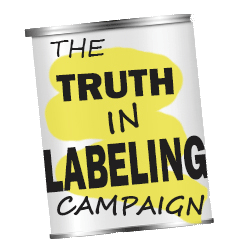The glutamate industry has been trying for a very long time to promote MSG and other free glutamate-containing additives* as “good for you” ways to reduce sodium. Now, with a helping hand from its friends at the FDA, these brain-damaging additives will be used in even greater quantities and in foods you might not expect to find them in.
On April 10, the proposed rule called “Use of salt substitutes to reduce the sodium content in standardized foods” was published in the Federal Register concerning foods that fall under an old FDA regulation called a “standard of identity,” or SOI.
The FDA first established SOI rules way back in 1939 as a way to protect consumers from jams that contained no fruit and peanut butter with nary a nut. But like so many FDA maneuvers, the SOI is morphing into a way to help Big Food use even more brain-damaging additives. In essence, an SOI defines what makes up a particular processed food – in some cases even how it looks and how it must be formulated. The FDA currently has a legally binding SOI for 250 items ranging from pasta to bread to cheese and condiments, consisting of a detailed description of that food and what it can (or must) contain. Around 140 specify salt – either as a required or optional ingredient.
And that’s where Big Food is being given a big opening.
The proposal calls to amend the SOI in those 140 foods to allow manufacturers to swap out some or all of the sodium they contain with “salt substitutes,” something that would not be allowed under the current regulations. And what might those salt substitutes be, you ask?
Good question. And it’s one the FDA isn’t prepared to answer.
As stated in its pre-publication notice “We are proposing to define salt substitute broadly to provide flexibility and facilitate innovation in the future without the need for additional rulemaking.”
The FDA did add this line as an example of ingredients in the “scientific literature” that can be used to replace salt: “…herbs and spices, yeast extracts, monosodium glutamate, amino acids and dairy extracts.”
FDA Commissioner Robert Califf called the proposal “another step forward in our efforts to improve nutrition and reduce chronic disease by providing manufacturers another tool to lower the use of sodium in food.”
Dr. Califf forgot to take into account that MSG and other free-glutamate-containing ingredients contribute to brain damage, obesity, infertility, A-fib, migraine headache, asthma, seizures, and many other diseases and ailments.
Thank you Julia Muldawer
As of this writing a meager 10 comments have been sent to the FDA regarding this proposal, half of which were signed off “anonymous” despite the fact the authors fully agreed with the rule change. Most of those who left a comment thought this was a super idea!
Except for Julia Muldawer.
This individual had the insight to call it like it is. Julia wrote: There is absolutely NO NEED to use salt substitutes in food. Just decrease the amount of salt. We do NOT want another chemical man-made thing in our food. We strongly oppose the use proposed.
Perhaps this MSG-friendly rulemaking notice didn’t get a lot of attention. Or maybe folks just don’t grasp how this opens the door for even more disguised excitotoxins in the food supply. Whatever the reason, you still have a chance to tell the FDA exactly what you think about this proposal as the comment period goes until August 8.
To leave a public comment at the Federal Register, go here https://www.regulations.gov/document/FDA-2022-N-2226-0001/comment and click the blue “comment” button on the top left.
And don’t let Julia Muldawer be the only one to tell the FDA that this is a really bad idea.
*Free glutamate is the free form of the excitotoxic – brain damaging – amino acid present without exception as an ingredient or component of monosodium glutamate (MSG) and all other flavor-enhancers. Along with MSG, there are more than 60 additives that contain brain-damaging free glutamate. For a complete list go here.


